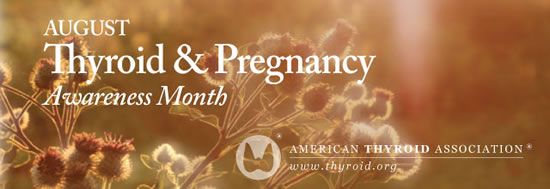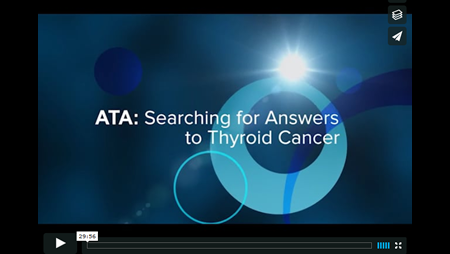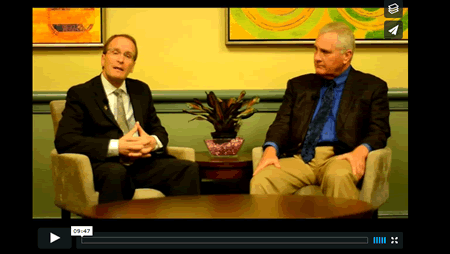Clinical Thyroidology for the Public summarizes selected research studies discussed in the previous month’s issue of Clinical Thyroidology, an official publication of the American Thyroid Association. Editor-in-chief, Alan Farwell, MD, FACE
Available in pdf format for saving and printing and Web page format for viewing online
PDF Format for Saving and Printing
Clinical Thyroidology for the Public Volume 13 Issue 8 (PDF file, 7.0 MB)
TABLE OF CONTENTS – Web Format
THYROID AND PREGNANCY
Postpartum thyroid function in women with subclinical hypothyroidism during pregnancy
If the thyroid has decreased reserve for any reason during pregnnacy, the mother may develop mild/subclinical hypothyroidism during the pregnancy. In some, but not all, of these women, thyroid function returns to normal after delivery. This study examined the changes in thyroid function after pregnancy in women who developed subclinical hypothyroidism during pregnancy.
Li N et al. Postpartum follow-up of patients with subclinical hypothyroidism during pregnancy. Thyroid. 2020. ePub: June 5, 2020. DOI: 10.1089/thy.2019.0714. PMID 32375594
(PDF File for saving and printing, 227 KB)
THYROID AND CANCER
Development of thyroid problems with immunotherapy drugs for certain cancers is associated with favorable survival
New chemotherapy drugs for the treatment of cancer have been activating the immune system to target and kill cancer cells. Prior studies have suggested that the cancer patients who develop thyroid problems while taking immunotherapy drugs have improved survival. The goal of this study is to evaluate the association between thyroid function test results, anti-thyroid antibody concentrations and survival rates in a large group of cancer patients treated with anti-PD-1 drugs.
Basak EA et al. 2020 Overt thyroid dysfunction and antithyroid antibodies predict response to anti-PD-1 immunotherapy in cancer patients. Thyroid. Epub 2020 Mar 10. PMID: 32151195.
(PDF File for saving and printing, 117 KB)
HYPOTHYROIDISM
Obese women with hypothyroidism treated with levothyroxine have a reduced energy expenditure
Hypothyroidism decreases metabolism. Once thyroid hormone levels return to normal on levothyroxine, metabolism returns to normal. A previous small study has suggested that the resting energy expenditure is lower in patients with hypothyroidism even if they are treated with levothyroxine and their thyroid hormone levels are in the normal range. This study was done to determine the resting energy expenditure in a group of obese women with hypothyroidism attending a bariatric clinic.
Muraca E et al 2020 Resting Energy Expenditure in Obese Women with Primary Hypothyroidism and Appropriate Levothyroxine Replacement Therapy. J Clin Endocrinol Metab. Apr 1;105.
(PDF File for saving and printing, 167 KB)
THYROID CANCER
Being overweight is linked to a genetic mutation that causes increased risk of thyroid cancer
It is clear that obesity is a risk factor for different types of cancers, possibly may be associated with thyroid cancer. Part of this association is that the increase in thyroid cancer has mirrored the increase in obesity in the United States. To determine if there is a genetic link between these 2 disorders, this review was done to determine if BRAFV600E-positive thyroid cancer was associated with obesity.
Rahman S et al 2020 Obesity is associated with BRAFV600Emutated thyroid cancer. Thyroid. Epub 2020 Mar 31. PMID: 32228152.
(PDF File for saving and printing, 287 KB)
THYROID CANCER
Aggressive types of thyroid cancer are becoming more common and differ from one another in how dangerous they may be
Classical papillary thyroid cancer is the fastest rising type of thyroid cancer and is generally slow growing with an excellent prognosis. There are several more aggressive thyroid cancer subtypes tend to grow faster and spread. To date, it is unclear if these subtypes are also rising in frequency and if there are really more dangerous. The study described here tries to answer these two questions by evaluating the medical records of large groups of people previously treated for thyroid cancer.
Ho AS et al 2020 Incidence and mortality risk spectrum across aggressive variants of papillary thyroid carcinoma. JAMA Oncol. Epub 2020 Mar 5. PMID: 32134428.
(PDF File for saving and printing, 287 KB)
THYROID CANCER
Detecting thyroid cancer recurrence following lobectomy
More frequently, patients diagnosed with thyroid cancer who are low risk and with the cancer confined to one lobe are offered to be treated a lobectomy. However, in patients with a normal lobe after a lobectomy, following the thyroglobulin levels are much less reliable as a cancer marker. In this study, the authors report on their experience from a single institution on measuring thyroglobulin levels after a lobectomy for thyroid cancer.
Ritter A et al 2020 Detecting recurrence following lobectomy for thyroid cancer: Role of thyroglobulin and thyroglobulin antibodies. J Clin Endocrinol Metab 105:1–7. PMID: 32219303.
(PDF File for saving and printing, 287 KB)









